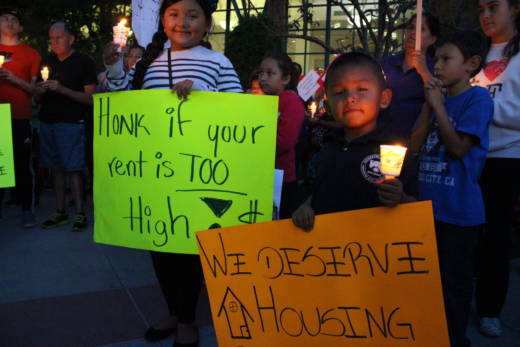Mountain View voters passed one rent control provision, Measure V, by 53-47 percent. They narrowly rejected the competing Measure W, sponsored by the city council, with a vote of 51-49 percent.
Voters in Burlingame resoundingly rejected that city's Measure R, by a margin of 67-33 percent.
Longtime Burlingame resident Alisa Ruiz-Johnson was campaigning against the measure earlier on Tuesday.
"We're safe here. We have a very utopian place. We do have a need for affordable housing but we need to figure this out as a community,” she said, adding that a rent board Measure R would have established lacked sufficient oversight.
San Mateo voters similarly trounced that city's rent control initiative by 61-39 percent.
Renter advocates for both San Mateo and Burlingame shared an election party at Caribbean Garden, a salsa club in Burlingame. There was dancing and as the night slowed down, those in attendance gathered for a quick speech from Jennifer Martinez with Faith in Action -- which led the rent control campaign in San Mateo and supported all the Peninsula measures. She said even though the results don’t look favorable in San Mateo and Burlingame, her coalition and the volunteers that have come out are not through fighting to stay in their homes.
“I don’t think people are going to stop trying to change and make housing a more just issue,” she said. “I think we’ve definitely awoken a voice. It’s not the end of building a coalition that is concerned for working families and middle-income families."
The issue of rent control hasn't garnered this much attention in California for decades, ever since a renters' movement was born in the wake of Proposition 13, which passed in 1978 and reduced property tax rates.
Between 2010 and 2014, the Bay Area's population grew by roughly 270,000 people, while fewer than 40,000 units of housing were added, according to the state Department of Finance. Competition in the housing market has been fierce as rents continue reaching record highs, and that has led to stories about mass evictions and displacement.
Most people involved in the debate about how to solve the housing shortage agree on one thing: More housing needs to be built. But that could take a long time. Thus, the tension around what a fair compromise might be in the meantime.
On the tenants' side, rent control is a way to slow or stop the immediate displacement of people in the Bay Area -- especially those with lower and middle incomes. Small-property owners have also argued that they may be priced out if they can't afford to maintain their rental units.
The issue of rent control is not likely to subside with Tuesday's vote. Some cities, like Concord, are in the midst of determining how to slow displacement caused by rising rents, while renters in other cities, like Redwood City, have been aggressively pushing their city leaders to take up rent control.
